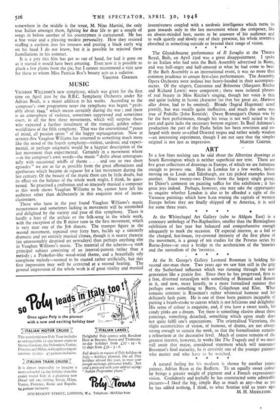MUSIC
VAUGHAN WILLIAMS'S new symphony, which was given for the first time on April 21st by the B.B.C. Symphony Orchestra under Sir Adrian Boult, is a major addition to his works. According to the composer's own programme notes the symphony was begun "prob- ably about 1944," which means certainly during the war ; and there is an atmosphere of violence, sometimes suppressed and sometimes overt, in all the first three movements, which will surprise those who expected a further instalment of the tranquil, golden other- worldliness of the fifth symphony. That was the conventional "peace of mind, all passion spent" of the happy septuagenarian. Now at seventy-five Vaughan Williams has returned to something much more like the mood of the fourth symphony—violent, sardonic and experi- mental, or perhaps enigmatic would be a happier description of the last movement than experimental. Certainly in a movement where —in the composer's own words—the music "drifts about contrapun- tally with occasional whiffs of theme . . . and one or two short episodes" we are as far as possible from the great affirmations and apotheoses which became de rigueur for a last movement during the last century. Of the beauty of the music there can be little doubt, but its effect on the balance of the whole work might, I think, be ques- tioned. So practised a craftsman and so intensely musical a composer as this work shows Vaughan Williams to be, cannot have left his audience other than deliberately in this exquisite mist of incon- clusiveness.
Those who have in the past found Vaughan Williams's music monotonous and sometimes lacking in movement will be astonished and delighted by the variety and pace of this symphony. There is hardly a hint of the archaic or the folk-song in the whole work, with the exception of the B minor tune in the first movement, which is very near one of the lob dances. The trumpet figure in the second movement, repeated over forty bars, builds up a sinisterly dramatic and yet entirely musical climax, though it is nearer rhetoric (an unreasonably despised art nowadays) than perhaps anything else in Vaughan Williams's music. The material of the scherzo—a stark principal subject consisting of an interval-pattern rather than a melody ; a Prokofiev-like wood-wind theme, and a beautifully oily saxophone melody—seemed to be treated rather artificially, but this first impression may well be corrected at a second hearing. The general impression of the whole work is of great vitality and musical inventiveness coupled with a sardonic intelligence which turns its gaze inwards only in the last movement where the composer, like an absent-minded host, seems to be unaware of his audience and to walk quietly and‘slowly out of their presence, his whole attention absorbed in something outside or beyond their range of vision. * • * *
The Glyndebourne performance of ll Seraglio at the Theatre Royal, Bath, on April 23rd was a great disappointment. I spoke to an Italian who had seen the Bath Assembly advertised in Rome, and was half-angry and half-amused at what he had come to hear. If the Bath Assembly is an international event, it was no more than common prudence to ensure first-class performances. The Assembly Opera Orchestra were zealous- but heavy-handed in their accompani- ments. Of the singers, Constanze and Belmonte (Margaret Ritchie and Richard Lewis) were competent ; there were isolated phrases of real beauty in Miss Ritchie's singing, though her voice is thin and quite lacking in heroic character (so that her great air, Martens aller Arten, had to be omitted). Blonde (Ingrid Hageman) acted prettily, but was vocally quite ineffective, and much the same was true of Pedrillo (John Kentish). Owen Brannigan's Osmin was by far the best performance, though his voice is not well suited to the part and quite lacks the necessary bottom register. In Basil Ashmore's production the part of the Pasha Selim has been rewritten and en- larged with many so-called Oriental tropes and rather windy wisdom —an interesting experiment, though I am not sure that the simpler
original is not just as impressive. MARTIN COOPER.






























 Previous page
Previous page